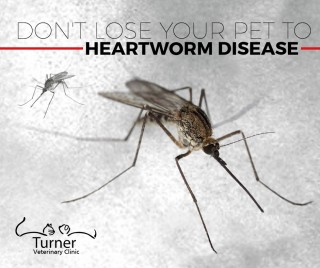Turner Veterinary Clinic News
Don't Lose Your Pet to Heartworm Disease

Heartworm is a common parasite in dogs, cats, ferrets, and several mammal species. During National Heartworm Prevention Month, we urge you to learn more about the transmission, symptoms, and treatment of this parasite. Left untreated, heartworm disease can cause serious illness or the death of your beloved pet.
What is a Heartworm and How Does It Get Inside Your Pet?
A heartworm is approximately 12 inches long and lives inside the blood vessels, heart, and lungs of animals who are infected with it. The most typical course of transmission is through a mosquito. When a female heartworm is present inside of a dog or cat, she can reproduce thousands of microscopic worms that travel to the bloodstream. A mosquito ingests some of these baby worms when it stings an infected pet and feeds on his blood. Heartworm transmission occurs the next time the mosquito bites a pet.
Symptoms of Heartworm in Dogs and Cats
Heartworms can live up to seven years in dogs and up to three years in cats. However, the two types of animals exhibit entirely different symptoms when infected. The first signs in dogs include early fatigue, appetite loss, persistent cough, and weight loss. Dogs with advanced heartworm disease will have a swollen belly, bloody urine, and labored breathing.
Cats tend to display either subtle or dramatic symptoms with no middle ground. Common symptoms include vomiting, appetite and weight loss, and coughing that develops into asthma. As the disease progresses, an infected cat may experience problems walking as well as fainting and seizures. Some cats show no symptoms of heartworm infestation until they collapse and die.
Diagnosing and Treating Heartworm Disease
If you’re the pet parent of a puppy or kitten, schedule an appointment with Dr. Huelsebergen at Turner Veterinary Clinic when she is six months old. Dogs should be tested annually thereafter and started on a heartworm preventive as soon as possible. You can greatly reduce your cat’s risk of getting heartworm by keeping her indoors.
We encourage you to speak to Dr. Huelsbergen to establish a heartworm protocol for your pet as soon as possible. For your convenience, our clinic offers several different types of heartworm prevention products in our online store.
Categories
Recent Posts

February is often associated with love, thanks to Valentine’s Day, and that makes it a perfect time to show extra care to the pets who mean so much to us. While treats and cuddles are always appreciated, one of the most meaningful ways to support your pet is by focusing on their health from the inside out. Dental health and heart health may seem like separate topics, but they are closely connected and both play a major role in your pet’s overall wellness.

When was the last time your pet saw the veterinarian for a checkup, not because they were sick, but just to stay healthy? Preventive care is one of the most important ways to give your pet a longer, happier life. It’s not about doing one big thing. It’s about the small, consistent steps that help avoid bigger health problems later on.

The holidays are full of sparkle, laughter, travel, and to-do lists a mile long. As joyful as this season can be, it often means busier schedules and less time for everyday routines. In the middle of the holiday rush, it's easy to overlook one very important family member: your pet.

If you're lucky enough to have a senior pet, you know just how special that bond becomes over time. From cozy afternoons on the couch to the look in their eyes that says, "I've known you forever," there’s a deep and quiet understanding between you. As pets get older, though, their needs change. Aging isn’t a disease, but it does require us to adapt how we care for our beloved companions.
The good news? With the right care and attention, senior pets can enjoy happy, healthy golden years. Here are seven simple but meaningful health tips to help your older dog or cat feel their best.

Has your dog seemed a little more reserved lately, or is your cat less interested in playing with their favorite toys? It can be easy to attribute these changes to aging or mood, but pets are experts at hiding discomfort. The good news is that there are plenty of subtle signals that can provide clues that your pet may be experiencing pain, and many treatment options to help alleviate this discomfort.